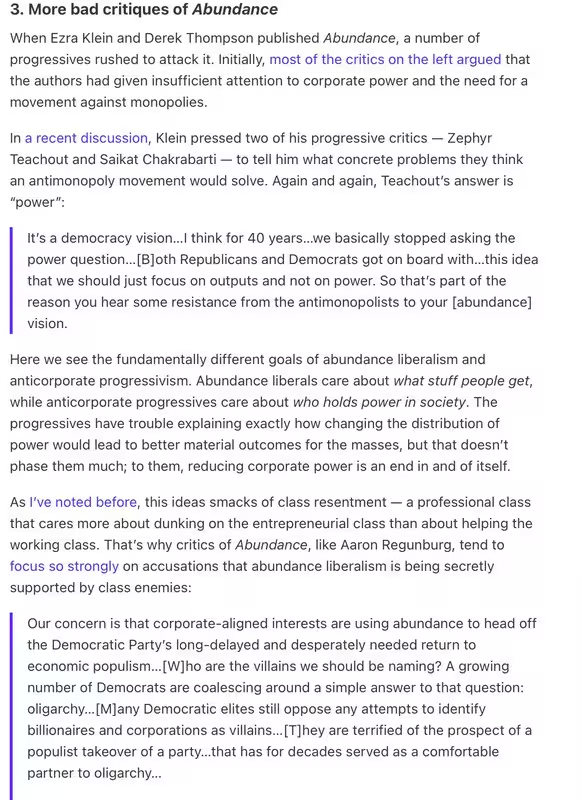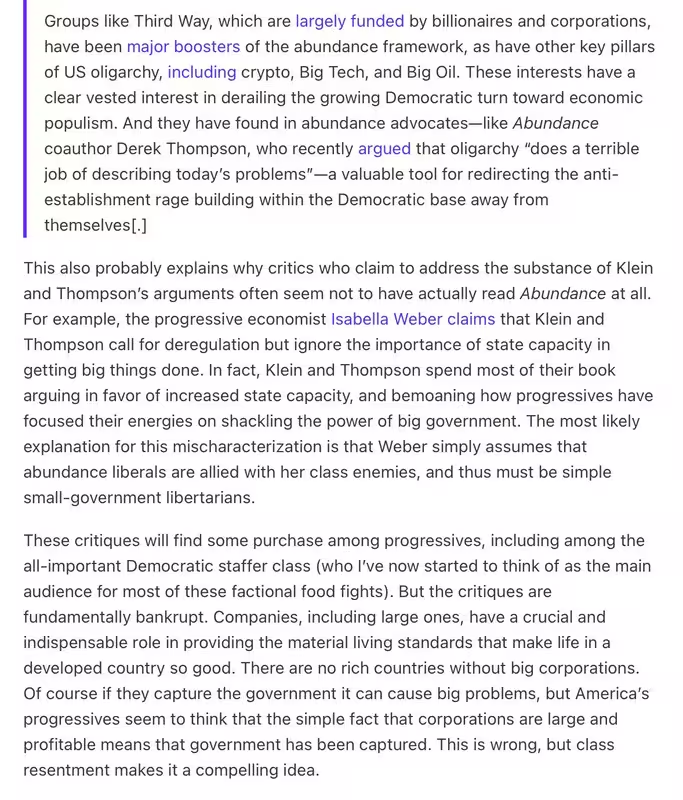@Pull Up the Roots @Rice N Beans @Loose @Black Panther
Leftists in democratic run areas have fukked up. It’s time to grow up and own it.
An Abundance Reading List
An Abundance Reading List
Why are there so many obstacles to getting things done? These writers have the answer.
Francis Fukuyama
A crane, not in California. (Photo by Jarama via Getty.)
Just so you know: In addition to this column, Francis Fukuyama also writes for the main Persuasion mailing list. That means that if you don’t subscribe to Persuasion, you might miss out on receiving some of his essays!
Ezra Klein and Derek Thompson’s new book Abundance has gotten a good deal of well-deserved attention, and I would like to say up front that I am one hundred percent onboard with their argument and movement.
Their basic argument is that modern democratic countries, and particularly the
United States, have created too many barriers to building things and implementing new ideas. The ability to build could help human beings live better and deal with the enormous challenges of the present, like unaffordable housing or climate change. At the present moment, the Trump administration, Elon Musk, and DOGE all seem intent on undermining the American state and reducing its capacity to govern. But at the core of Abundance’s analysis lies the observation tha
t many of the biggest obstacles to doing things have been put in place by progressives who, while well-intentioned, have promoted counterproductive policies that have made achievement of their goals nearly impossible.
To take one example from the book, consider housing. Blue states like California, Washington, and New York have seen an enormous increase in housing prices over the past couple of generations. Conventional statistics like Gini coefficients that seek to measure income inequality understate the degree to which inequality has widened, because they do not take into account the unaffordability of housing for working-class people.
No one on the salary of a schoolteacher, policeman, or fireman can afford to live in the city of San Francisco; people doing these jobs have to spend an hour or two commuting into the city from a very distant suburb.
The reason for this escalation in costs is a very simple matter of supply and demand:
supply of housing in virtually every blue state has not kept up with population growth. And the reason that supply has been constrained is that liberal voters have enacted permitting and zoning rules that make new construction very difficult. In previous blog posts I’ve talked about CEQA, the California Environmental Quality Act, which gives standing to all 40 million residents of the state to sue any project, public or private, that they don’t like.
It’s not just housing that can’t be built. The phenomenon that I labeled in Political Order and Political Decay as “vetocracy” blocks everything. In the United States today,
the leading producers of alternative energy are Texas and Oklahoma, red states which nonetheless have produced massive wind farms not just because of the prevailing winds, but also because of lighter permitting rules. The problem today is a failure to build transmission lines to get that electricity from where it is produced to where it is needed, like the West Coast. The time to complete a transmission line is nearly 10 years, which means that the United States will have a very hard time meeting its climate goals. And this is before the Neanderthals in the Republican Party launch their latest effort to undermine existing environmental regulation.
So, left-leaning liberals and progressives have played a huge role in crippling America’s ability to implement the policies that these groups say they are in favor of. At this point, there is substantial literature on how this came about, and the following is a short reading list of works that explain how we got here.
Perhaps one of the clearest statements of the problem is a Michigan Law Review article by Nicholas Bagley on the “
procedure fetish.” Bagley was counsel to Democratic Governor Gretchen Whitmer, and is now a law professor at the University of Michigan. Bagley explains that
progressives want to use the government to do things like reduce inequality and pursue social justice goals, but they also believe that legitimacy lies in ever-increasing layers of proceduralism. This proceduralism then prevents progressives from actually achieving the ends they seek. He notes that ordinary people tend to regard concrete outcomes as more important than procedural correctness, and will reward politicians who actually get things done.
Paul Sabin’s Public Citizens traces the rise of public interest law, beginning most famously with Ralph Nader and his Public Citizen organization. Nader argued that the regulatory agencies founded during the New Deal had been captured by corporate interests, and were working hand-in-glove with the auto industry, pharmaceutical companies, oil and gas interests, and other sectors contributing to pollution, unsafe vehicles, consumer fraud, and other wrongs.
His movement inspired a couple of generations of progressive law students to go not into government, but rather to become litigators suing government agencies in an effort to block their activities. Nader and other public interest activists did as much as Ronald Reagan to reshape Americans’ view of the federal government as a malevolent force that needed to be constrained and weakened.
This view was put in a broader historical perspective by Marc Dunkelman, whose book Why Nothing Works I discuss in my Persuasion article “Our Hamiltonian Moment.” Dunkelman describes two trends in progressive thought, a “Hamiltonian” one that sees government as a potential force for good, and a “Jeffersonian” one that regards government with suspicion and seeks to distribute power as widely as possible to ordinary citizens. The Jeffersonian impulse was what powered the sort of public interest litigation described in Sabin’s book, as well as the many participatory mechanisms that were increasingly built into U.S. government decision-making. This institutional diffusion of authority makes collective action hard if not impossible, and leads to
vetocracy.
Abundance recommends permitting reform as a means of shifting gears to a more Hamiltonian approach of building things. This is of course necessary; there are both policy changes and institutional reforms that could reduce veto points and facilitate collective action. However, the state itself needs to build capacity and increase its effectiveness by undergoing a thorough reform. The best book I know on the dysfunctions of contemporary American government is Jennifer Pahlka’s Recoding America. Pahlka founded Code for America, an NGO devoted to helping state and local governments better utilize digital technology. She went to Washington on the eve of the rollout of Obamacare and saw the debacle of a failing policy up close, and in response helped to found the U.S. Digital Service (now taken over and rebranded by Musk and DOGE). Among the many ills she describes, existing bureaucrats are incentivized to comply with the many complex rules governing their behavior.
Americans have never trusted the government, and civil servants have been hemmed in over the years by layers of rules and regulations. Moreover, they attach much higher prestige to being a policy-maker rather than being a policy-implementer, which means that well-meaning policies (like Obamacare) end up being badly executed. Once again, procedure gets in the way of results.
My Stanford colleague Bruce Cain wrote a book a few years ago called Democracy More or Less. He notes the Jeffersonian impulse among progressives to diffuse power by creating ever-more mechanisms of public participation. These began with early 20th century institutions like California’s initiatives, referenda, and recalls, and continue through the extensive requirements for public hearings, notice-and-comment, and other ways of getting democratic input. The problem, according to Cain, is that these mechanisms are often captured by powerful, well-organized interest groups that do not necessarily represent a general democratic consensus. Public participation is necessary for modern government to work, but too much participation increases the time and cost of decision-making, and sometimes makes collective action altogether impossible.
Finally, I would point to a piece that I recently published in the Journal of Democracy, co-authored with Stanford colleagues Beatriz Magaloni and Chris Dann. Here we take issue with democracy expert Tom Carothers, who argued that democratic backsliding was not related to failures to deliver concrete outcomes like citizen security, economic growth, or public infrastructure. His empirical methodology was wrong, and a fuller analysis shows that failure to achieve real-world results is indeed one of the causes of the general weakness of democracies worldwide.
These are not simply academic arguments. During the 2024 presidential campaign, Kamala Harris pitched a lot of her case for being president on the threat that Donald Trump posed to American democracy. As we understand all-too-well now, these threats were real and American democracy is in the process of being undermined as we speak. But voters were much less moved by the procedural violations committed by Trump (such as fomenting the January 6 assault) than by everyday problems with inflation and failure to control the southern border.
Procedure is important, but if politicians lose sight of their ability to bring about substantive changes to the lives of their constituents, they will continue to lose elections.
This suggests that the main way Trump’s opponents can win back power is by focusing on something like the agenda proposed in Abundance. The Democrats in particular need not simply to complain about Donald Trump’s many violations of law and the Constitution; they need also to have a forward-looking vision of what kind of America they hope to bring about if they return to power.
Building things and restoring an abundant society are good places to start.






 sports team for years instead of becoming a fan of a good one
sports team for years instead of becoming a fan of a good one